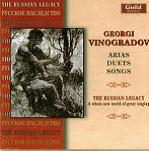About Vinogradov’s recorded performance of Lensky’s aria, this set’s annotator, Larry Friedman, writes, “Has it ever been done more poetically, more stylishly and with such beauty of tone? His voice arches and falls, sighs, murmurs and calls out, bringing the young Lensky to life as no one else has.” Well, our first instinct is to presume we’re dealing with a vaguely deranged fan. But in fact, he’s right: the voice we hear, from a 1945 recording (the 93 selections included in this nearly five hours of music were recorded between 1938 and 1954), is meltingly beautiful, naturally produced, plangent and plaintive without ever being sloppy or maudlin or resorting to any non-musical means. The tenor gives attention to the text as if he were living the thoughts for the first time, but without any emphasis not suggested by the composer or the notes. Vinogradov never sang opera on a stage; after World War II he took part in some radio broadcasts. He had a penchant for Russian popular song, and there’s plenty of that here (certainly more than anyone needs), and indeed everything on these four discs is sung in Russian, including Die schöne Müllerin.
In brief, Vinogradov is just gorgeous in the excerpts from Mignon–perhaps the most lyrical expressions of this music ever recorded (it’s almost a half-hour of highlights, with other Russian singers); he has no trouble with Almaviva’s coloratura in “Ecco ridente in cielo” (although he certainly lacks joy); and in a duet from Gounod’s Romeo et Juliette (with a forgettable Valeria Vladimirovna Barsova) he’s ravishing. The Die schöne Müllerin is weird, and it’s not just the language–Vinogradov seems thoroughly disconnected until about the fifth song. Rachmaninov’s “The night is sad” is touching and atmospheric, as are all of the feel-bad-about-the-universe Russian art songs.
The voice seems to be solid up to a B-flat, which Vinogradov can deal with in mezza voce; in fact, he almost never sings above mezzo-forte and you wonder if he can, without stretching and straining. I think what we have here is a voice limited in range and volume, but one that is so beautiful that every note, every intelligently sculpted phrase, is worth hearing. I wish a single-CD set of his work were available. This one is quite a commitment–and how many songs by Varlamov, Sokolov, Shiryaiv (with guitar accompaniment), Dubuque, and others do you really need? Even with the Red Army Chorus as a bonus. But indeed, Vinogradov is a ravishing singer, and you should know his work.
































